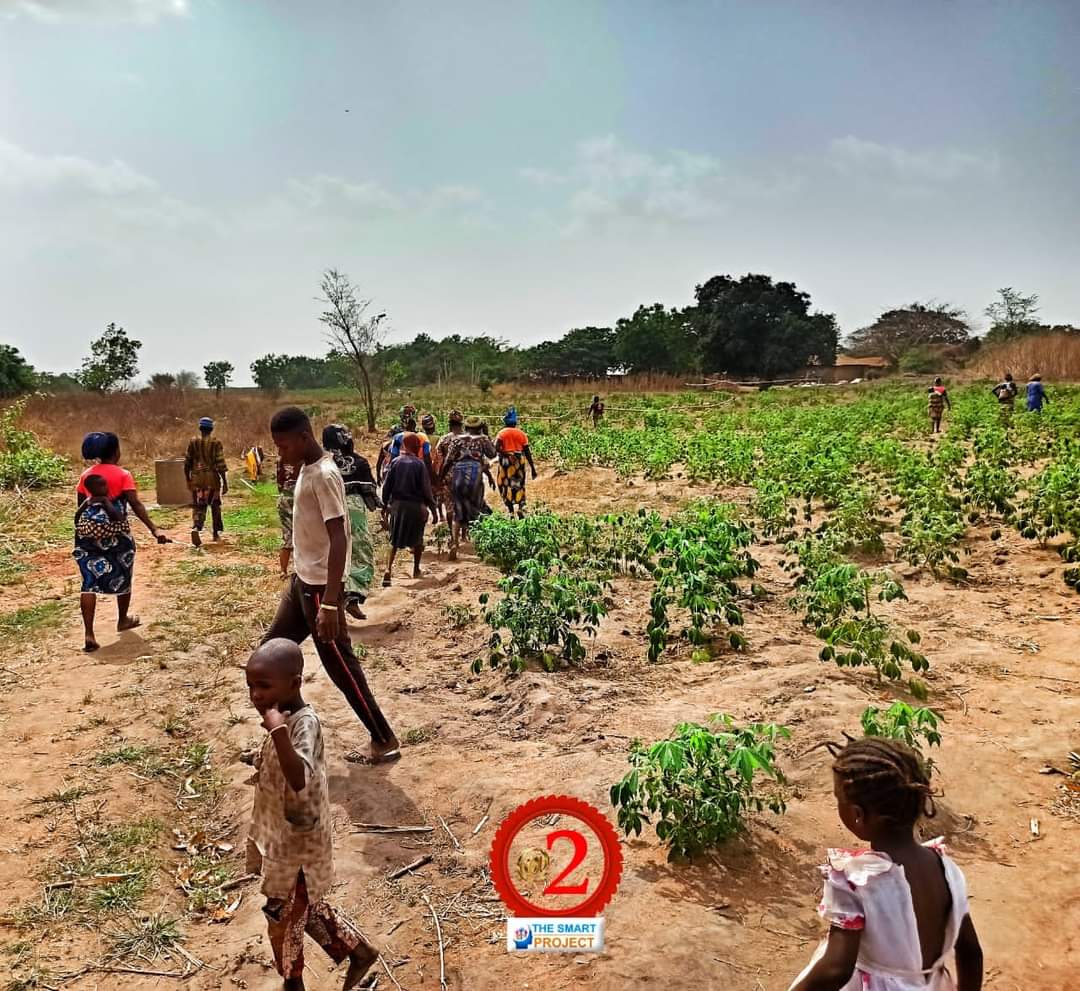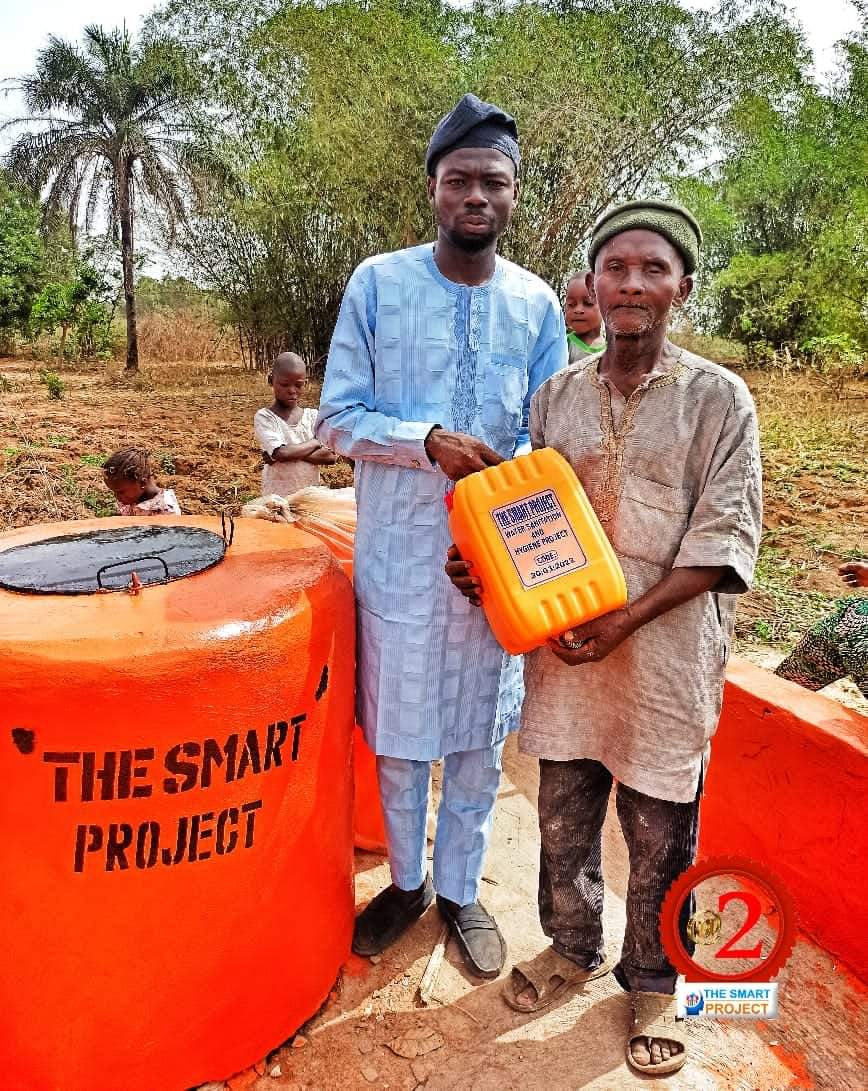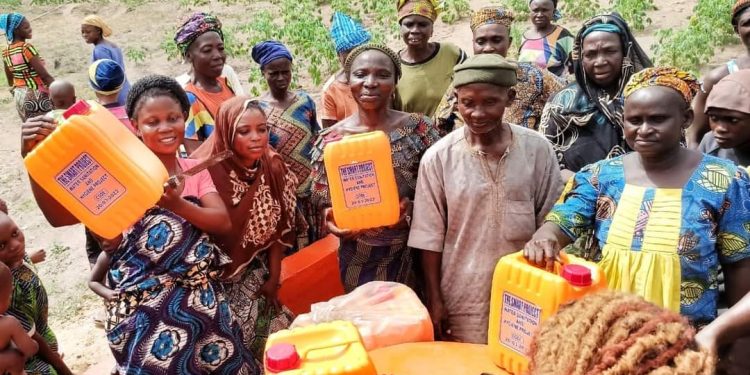The water problem in some local communities in Oyo State has reached a crisis point. The case of waterborne disease is a recurrent issue caused by the chronic shortage of safe water, making rounds. This problem has remained hydra-headed despite colossal sums of money budgeted by past and present governments.
For instance, in Onire Are Ago, a community in Oyo town, for some years, the residents did not have daily access to clean and safe water in their immediate community.
Meeting the daily water needs of the average family in the town was a difficult task. As a result of this, they had to walk about two kilometers away from the community to a nearby stream, so that they could have clean water for their domestic use such as for washing, bathing, and cooking.

A report by Nigeria’s Federal Ministry of Water Resources and UNICEF titled “Water, Sanitation, Hygiene National Outcome Routine Mapping” in 2019, shows that one-third of the Nigerian population drinks contaminated water at home and 46 million people are still practicing open defecation.
The data show there is still more work to be done to ensure that all Nigerians have access to adequate and quality water and hygiene services,” said the Minister of Water Resources, Suleiman Adamu.
“While we have made some progress – most notably in the number of households accessing basic water services – we cannot rest on our laurels. We will be looking at our overall strategy, based on these findings, to see how we can strengthen all areas of the water, sanitation, and hygiene in Nigeria – including making faster progress in ending open defecation across the country,” he further said.
The report findings come from a second round of the Water, Sanitation and Hygiene National Outcome Routine Mapping (WASH NORM II) exercise, carried out in collaboration with the National Bureau of Statistics and UNICEF.
Conducted just before the outbreak of COVID-19, it is the largest survey of its kind and the most comprehensive annual WASH data report to date. It underlines efforts by the Ministry of Water Resources and its partners to strengthen the sector’s planning and monitoring towards the achievement of results under SDG 6 on ensuring access to water and sanitation for all.
The WASH NORM II survey covered nearly 25,000 households and assessed more than 4,500 water facilities, more than 2,000 schools and 1,300 health facilities, 1,250 markets and motor parks, and customers of 28 state urban water utilities across the 36 states and the Federal Capital Territory (FCT).
In 2012, the World Health Organization, WHO, and United Nations Children’s Fund, UNICEF ranked Nigeria 3rd behind China and India as countries with the largest population without adequate water supply and sanitation coverage.
According to UNICEF Executive Director, Anthony Lake, millions of children in Nigeria and the world at large lack access to safe water which in return endangers their lives, undermines their health and jeopardizes their future.
Today, millions are groaning under the burden of unsafe drinking water. It is also a common sight to see women and children moving about with buckets and jerry cans in search of elusive safe water.
The report also revealed that about 600 million children worldwide (1 in 4) will be living in areas where water demand outstrips supply by 2040. In all of these, children will be most affected.
In the views of a Consultant Epidemiologist and Public Health Physician, Prof Akin Osibogun, poor water supply in terms of quantity and quality can increase the risk of various types of water-related diseases classified as waterborne impounding, water vector, water shortage, and water chemical diseases.
How SMART PROJECT Discovered Onire Ago Community
Succour came the way of the Onire Ago Community when in September 2020, Mr. Adejumo Obasanjo led the team of Smart Project on its menstrual hygiene program to the community, where sanitary pads and toiletries were distributed to women of reproductive age.
“During our interaction with the community members on how they can stay safe from any kind of diseases, the medical team discovered that they did not have access to clean water, as well as a public toilet to defecate, making them engage in open defecation,” said the Smart project leader.
In 2019, a report released by UNICEF disclosed that the Nigerian government launched a campaign to end open defecation in Nigeria and is committed to ending the practice by 2025.
In a bid to help cushion one of the two challenges, the team met the village head, popularly known as Baba Omo Ode to ascertain which of the two top the community’s list of priorities.
The community head said the best the organization could do was to provide them with access to good water, while they could live without a toilet facility.
Though this reason is not justifiable, Baba Omo Ode said feces from the open defecation practices serve as manure on their farmland, which was making them spend less on procurement of fertilizer.
“We reached out to our members and also to some people outside the organization to raise the amount needed for the project.
“We dug two separate wells in the community, but no water before we realized the need to engage a geologist for the Ground Penetrating Radar (GPR) system to discover a high source of water. This guided on a clear roadmap to know what stage and what next is needed on the project to be executed completely,” Obasanjo said.
In addition to the well water built after engaging the geologist who recommended a good location, the team also provided all 30 households in the community with a 10-litre keg each as water storage for domestic use.
Commenting on the project, the Executive Director of the Omo Iyakunmi Foundation, Alhaji Siyanbola Akinkunmi, best known as Omo Iya Kunmi, stated that the intervention was undoubtedly executed at the right time which helped to address one of the community’s issues, as it has helped to curtail the issue of water diseases in the community.

This project, the community head testified, had been a thing of joy to every member, as it relieved them of the stress they passed through in sourcing water for the day-to-day domestic work.
According to him, the 10-litre kegs distributed alongside the good project remain a huge asset for it helps them to store water for drinking for days.
One of the community residents, Mrs. Taiwo Ajani stated that she was part of those who benefitted from the distribution of keg, the one she said was used as storage for drinking water.
Corroborating the stance of Mrs. Ajani, another resident, Mr. Adeniyi Olawuyi, who is a farmer, also explained how the project was helping to hasten up their domestic chores seamlessly before the Smart project.
Recounting his experience before the intervention, Mr. Adigun Taiwo, a wood trader as well as a farmer in the community, stated that they passed through a lot of stress to get water for their daily needs and house chores.
He noted that they would have to walk for kilometers from the community to a stream if they must get some water.
“One needed to wake up very early in the morning to get clean water before those who use the water for commercial purposes such as laundry, get to the stream.
“There were times we wouldn’t be able to fetch water from the stream for days, due to lack of rainfalls which we link to climate change impact,” he said.
Lending his voice to Taiwo’s, Mrs. Ajoke Balogun, stated that she never prayed to experience those days again, because of the awful experience she had during one of her pregnancies.
“There is no one to help, due to the distance and one needs to walk down to the stream early in the morning to get the best of the water before it gets dirty due to rushing from other members of the community who don’t want to queue,” said Balogun.
SMART Project Cannot Solve it all
Lack of funding is a major setback for the nonprofit from expanding this initiative to other communities which need a similar intervention.
According to the team lead, Adejumo Obasanjo, lack of funds and sponsorship was hindering the organization from extending to other communities, facing perennial water problems.
He said the nonprofit outfit had been executing their projects based on group members’ contributions, and donations received from the privileged members of the public.
“My future aim is that the work we do in the Onire Are Ago community will spread to other communities dealing with comparable difficulties to assist them in leading healthy lives,” he said.
This story has been made possible by Nigeria Health Watch with support from the Solutions Journalism Network, a nonprofit organization dedicated to rigorous and compelling reporting about responses to social problems.

